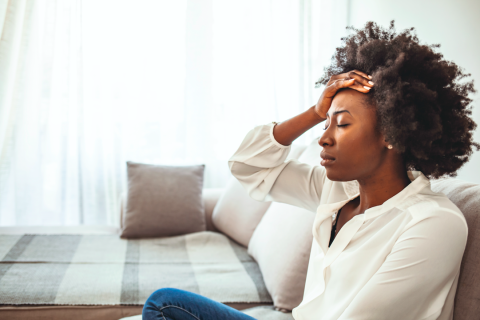Sunday Times Healthy Times
COVID-19
The World Economic Forum describes lockdown as “arguably the world’s biggest psychological experiment” – adding that “we will pay the price”. A review in The Lancet suggests that the psychological impact of quarantine is wide-ranging, substantial, and can be long-lasting, so it’s hardly surprising that so many South Africans are dealing with the fear factor right now. Having been deprived of our liberties, our livelihoods and, for a growing number, our lives, feelings of anxiety, frustration and uncertainty have become entrenched in our psyches.
“There’s no doubt that this pandemic has had devastating effects globally,” says clinical psychologist Zamo Mbele, “and sadly this will continue for many months and possibly years to come. The psychological impact of both the lockdown and the pandemic has been far-reaching, and while we won’t know the full picture for quite some time, what we can say is that everyone’s mental health will invariably be affected, albeit in different ways and to different degrees.”
We’re all taking strain
According to Cassey Chambers, operations director of the South African Depression and Anxiety Group (SADAG), the number of people reaching out to their helpline has doubled since the start of lockdown. “We’re now receiving about 1 200 calls each day, while our online Facebook expert chats are being joined by between 5 000 and 15 000 people at a time – another huge increase. Many callers are stressed about a combination of issues including the spread of COVID-19, finances, relationship problems, job security, grief, gender-based violence and trauma. They’re feeling anxious, lonely, worried and depressed, and since it seems that the virus is going to be with us for a very long time, this is of great concern.”
Mbele agrees. “Even through the lockdown restrictions are being slowly lifted, the disruption of our sense of control and the ‘new normal’ we now find ourselves living in have definitely left their marks. People have experienced – and many continue to experience – emotions similar to the Kübler-Ross stages of grief, including denial, anger, bargaining and depression, as they struggle to come to terms with what’s going on. The concomitant changes such as working, schooling and living in one environment have affected us all, while the distress of such massive upheavals has resulted in significant resentment and rage.”
Mbele says there’s also a great deal of uncertainty about the future, which is the bedrock of depression and anxiety. “Moreover, the reminder of our vulnerability – that we’re not immune to death and suffering – has left many of us feeling unsafe, which in turn can result in increased anxiety and depression.”
“There’s no doubt that this pandemic has had devastating effects globally.” – Zamo Mbele
When to seek help
It’s normal to experience negative feelings during times of crisis, says Zamo Mbele, but if these are long-lasting and are affecting your daily life, it’s important to seek professional help. So watch out for the following symptoms – in yourself and/or your loved ones:
- Continued disruption in sleep patterns
- Low moods that don’t respond to activities of leisure and pleasure
- An inability to feel happy and enjoy things you previously enjoyed
- Irritability and aggression
- Antisocial drinking habits
- Thoughts of hopelessness and helplessness
SADAG offers a great deal of help in the form of an online toolkit on sadag.org that provides articles, coping tips, podcasts, online videos and more.
You can also:
- SMS 31393 – a counsellor will call back (available 24 hours a day)
- WhatsApp chat via 076 882 2775 with a counsellor seven days a week, from 9am – 4pm
- Call their helplines for free telephonic counselling: 0800 21 22 23, 0800 70 80 90, 0800 456 789, 0800 12 13 14, and their Suicide Crisis Helpline 0800 567 567 (all available 24/7).
Not just gloom and doom
While Mbele maintains that the general anxiety, hyper-vigilance and sense of discomfort are not going to go away, it’s important to remember that not everyone will suffer from protracted, significant psychological distress. “People are resilient,” he says, “especially when it comes to survival, and there’s also a lot of help out there.”
Chambers concurs. “There are many ways to cope during these extremely challenging times,” she says. “Aside from seeking professional advice, there’s a lot you can do to help and empower yourself. Yes we’re living in frightening times, yes it’s frustrating, and yes it’s natural to feel out of control. But instead of trying to suppress these feelings or letting them overwhelm you, you need to acknowledge their existence, allow yourself specific times to feel them, and then move on to focus on the things you can control and do.”
“Aside from seeking professional advice, there’s a lot you can do to help and empower yourself.” – Cassey Chambers
COVID-19 mental health fast facts
An online COVID-19 and lockdown survey conducted by the University of Johannesburg’s Centre for Social Change together with the Developmental, Capable and Ethical State research division of the Human Science Research Council found that:
- 60 per cent of South Africans are feeling frequently stressed • 46 per cent are scared
- 33 per cent are depressed
- 35 per cent are irritable
- 26 per cent have felt sad
- 18 per cent have experienced anger
70 per cent: this is the number, according to the American Psychological Association, of Americans who are stressed about the economy right now (last year’s number in their Stress in America survey was 46 per cent).
Coping mechanisms
Chambers and Mbele offer the following coping tips.
- Stick to a routine. The absence of one can lead to disorientation and exhaustion. You may have to reinvent your day around working from home and looking after/ homeschooling kids, if this is your choice. Create a list of things to do to keep busy and active. Put it up on the fridge so that the whole family can become involved and make suggestions.
- Physical health, alongside healthy eating, has never been more important. Even though your usual gym workout may not be available, there’s always the outdoors and online classes to keep you moving. Try to get some fresh air and exercise every day.
- Practice mindfulness. Find moments in the day that allow for breaks from the monotony of nothingness if you’re not working, or the stress and anxiety of trying to balance working with kids at home.
- Try putting things in perspective. Remember that it could be worse, and that it will end.
- Reach out for professional help if necessary. Now is the time to look after your family and yourself.
- Ground yourself in science. Practise healthy and considered news consumption by using only reliable sources at designated times and durations. Avoid watching or reading news or social media, especially dubious news, where facts can become blurred and exaggerated. Always stick to what acknowledged experts have to say. SADAG suggests using the following reliable resources: cdc.gov/coronavirus/2019-nCoV; who.int/emergencies/diseases/novel-coronavirus-2019sacoronavirus.co.za;
National Department of Health WhatsApp: 060 012 3456.





